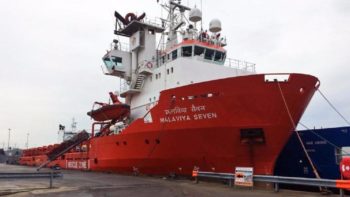
Twelve Indian seafarers are closer to going home after a Scottish court agreed to the sale of the Malaviya Seven, an India-owned and -flagged platform support vessel that has been detained in Aberdeen since June 2016, the UK Chamber of Shipping said.
The hearing, held on August 10, is a step in the right direction for the vessel’s Indian crew, some of whom have been onboard the ship for 16 months. But the ordeal is not over yet.
A total of 24 seafarers, including some who have already been repatriated, are owed over USD 867,000 from the vessel’s owner, India-based GOL Offshore.
Subsequent to the hearing, the crew’s collective wages have been capped at USD 1,500 per day until further notice. The International Transport Workers’ Federation (ITF) regrets the wage cap but said agreeing to the arrangement was the only tool it could use to get the court to expedite the claims process, which the ITF thinks has dragged on unnecessarily.
The ITF said it has appointed its own independent assessor from Ireland, who will oversee the vessel’s sale – but it’s impossible to know how long it will be before it takes place. The court first needs a ‘for sale’ report before it will issue its decree ordering the auction. In the ITF’s view, there is now no incentive for vessel’s sale to be hurried along as, it said, “the costs are coming from the pockets of the crew”.
Even if the vessel were sold tomorrow, it remains to be seen how much money would end up in the crew’s hands. The crew members have a high-ranking maritime lien on the vessel for their outstanding wages – only the expenses of the Admiralty Marshal take precedence.
However, how much they recover will depend on how much the ship is sold for in today’s depressed market, according to the UK Chamber. Malaviya Seven’s current market value stands at USD 1.1 million, while the ship’s demolition value is USD 870,000, VesselsValue’s data shows.
As explained by the UK Chamber, the hearing’s outcome only highlights a complex web of difficulties that will take time to be resolved and for which seafarers bear the brunt. But the crew’s extended stay in Aberdeen has been made as comfortable as possible, thanks to the help of local seafaring charities.
The vessel was detained on June 14, 2016, by the UK Maritime & Coastguard Agency (MCA). “Then, there was a hope that they would get out really quite soon but that lasted only two or three months and then they were released, paid their three months’ wages, they went out into the bay of Aberdeen and they came back in and they were detained again,” Father Douglas Duncan, Apostleship of the Sea’s (AoS) Aberdeen & Northeast port chaplain, said.
“It was at the request of the ITF and the MCA – [the crew] hadn’t been paid wages and that was the top and bottom of it,” he continues. “Some of these guys had been on that ship then for well over the three months. Some of these guys have been on that ship now for 16 months – they haven’t been paid for 12 months,” Duncan added.
Although the crew have been provided for in Aberdeen, they remain under pressure to provide for their families at home.
The ITF has been vocal in its criticism of the Indian flag state, which it says has offered no help. Neither has the bank acting on behalf of the vessel’s owner, GOL Offshore.
Tim Springett, UK Chamber policy director, said that amendments to the ILO Maritime Labour Convention, 2006 (MLC) that entered into force in January this year would have helped the crew.
“The new requirement that all shipowners provide financial security to protect seafarers in the event that they are abandoned was agreed with occurrences such as this in mind. The crew would have become entitled to claim up to four months’ arrears of wages directly from the provider of the financial security – who would also have been obliged to pay for them to be repatriated,” Springett says. “Both the relevant flag and port states already had responsibilities under the MLC to intervene and ensure the repatriation of the crew where the owner of the ship has failed to do so.”
In Father Duncan’s view, the delays have been an attritional tactic to avoid having to pay the crew what they are due: “It looks like somebody is stalling this [case] for time,” the chaplain said prior to the hearing. “They want these guys to go home and get paid later, but if these guys go back to India, they know they will not get paid.”
Meanwhile, there remain seafarers on abandoned vessels around the world, who are still waiting to go home.
“The ILO maintains a database of ships and their crews that have been reported as abandoned. Around 90 cases are currently shown as unresolved – which is less than 0.1% of the total world fleet. But this is little consolation to the seafarers on these 90 ships who – in the most serious cases – have been waiting for several years to be paid and go home,” Springett explained.
“We sincerely hope that the MLC amendments will bring this hardship to an end,” Springett further said.
Copyright Ships & Ports Ltd. Permission to use quotations from this article is granted subject to appropriate credit given to www.shipsandports.com.ng as the source.